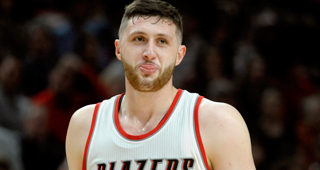Strictly speaking, it’s not the timing of Jusuf Nurkić’s injury that’s tragic. No, it’s obviously the incident itself: the grisly intra-body secession, what suddenly becomes the lower-lower leg violently separated from the rest of the now-former Unified Republic of Lower Leg with a fortune cookie-like snap. You hear that sound—audible on the broadcast and from the courtside seats—the crowd’s confused distress, and you understand what’s awful about it. No additional information required.
But context does compound the horror. It’s true that this could have happened two weeks into the season and Nurkić would still be in for a lengthy, miserable rehab stint, but it’s particularly cruel for it to happen in late March, when, on the brink of games that matter a lot, the basketball is broadly inconsequential. The Blazers clinched a playoff spot on Monday night, but they were already going to do that. Some days you show up to work only because that’s what you’re supposed to do. Nurkić was punching the clock, trying to help his team win a contest they didn’t need to win. His injury is like a firefighter breaking his back in a firehouse slip-and-fall. The stakes don’t come close to matching the damage done.
The burly Bosnian had been building such a strong season, the best of his career. At least half of all Blazers become cult figures, such is the obsessive folkloric verve of that fanbase, but Nurk would be a story anywhere. Never much more than a mammoth bruiser during his early career in Denver, he’s found his niche in Portland, and it’s a deep one. He’s a screen-setter and a bully in the paint, but he’s also shockingly nimble, has a soft touch around the rim, and occasionally flashes some Gasol-core passing out of the high post.
Nurkić is a player who seems to exist out of step with the rest of the NBA, but rather than being left behind by the modern game, as most massive humans with limited shooting range have been these past few seasons, he’s grown his game at the margins, doubled down on overpowering anybody who can’t bench-press a Victorian tub, and come out the other side a genuine problem for other teams. There are games in which he lives at the line, where he has improved his stroke considerably, and there are ones in which he just kind of ass-and-elbows his way to the rim three times in a row. You might be able out-quick him, try to strand him in space, but he’s smart and determined, and Stotts tries to keep his minutes down so he stays fresh. In short, nothing about playing against Jusuf Nurkić seems easy.
This is what admirers of cement highway dividers with surprisingly decent floaters have lost. Nurk’s team is pretty well boned too. C.J. McCollum has been banged up lately, and it’s difficult to criticize him, because he’s been playing about as well as he has for the past handful of seasons, but that means he’s got the same issues as always: he’s really just a less dynamic Dame Lillard clone, with roughly the same strengths and deficiencies, and while that’s fine, and it’s less than optimal. Nurkić was the dynamo who gave the Blazers something different when Portland’s Plan A of combo-guards-doing-stuff wasn’t working. It’s nice to be able to bring the chunky fellow out for a screen and let him create space for you, or to toss him the ball and rest your legs for a bit. Without Nurkić, who this season had been more prominent in the Blazers’ offense than ever before, Lillard will take it upon himself to shoulder even more of the scoring load, which isn’t always productive. (He’s a lot more economical when he’s aiming for 25 points rather than 40.) McCollum, if he can get himself right in time for the playoffs, can only be counted on for exactly what you’d expect. Shudder at the thought, Portland: Rodney Hood isolations might increase.
Similarly to Indiana’s Victor Oladipo predicament, which the Pacers have done a wonderful job fighting through, it’s not as if the Blazers have lost their shot at a title here, and it’s not as if they’re going to fall off a cliff either. But what we want out of NBA teams—the sturdy, worthwhile ones, which the Blazers certainly are—is to see them achieve their full potential, put in a season that, sure, maybe ends in the second round of the playoffs, but was undeniably, on the whole, something to be proud of. Jusuf Nurkić isn’t Portland’s best player, but he was perhaps the fullest embodiment of that ideal: a solid professional performing a fair bit better than that descriptor suggests, a truly exciting if slightly inconsistent and limited talent. Damned likable, a working artist at his peak.
Perhaps Nurk isn’t so great that the Blazers can’t figure out a way to replace his production, but his delightful peculiarity will be missing until he’s ready to play basketball again, which probably won’t be for a long while. He deserved to show it off in the postseason. Well, fairness is a myth. The most he can hope for is a steady recovery. If well-wishers help that process at all, he’s at least got plenty of those, in Portland and everywhere else.



